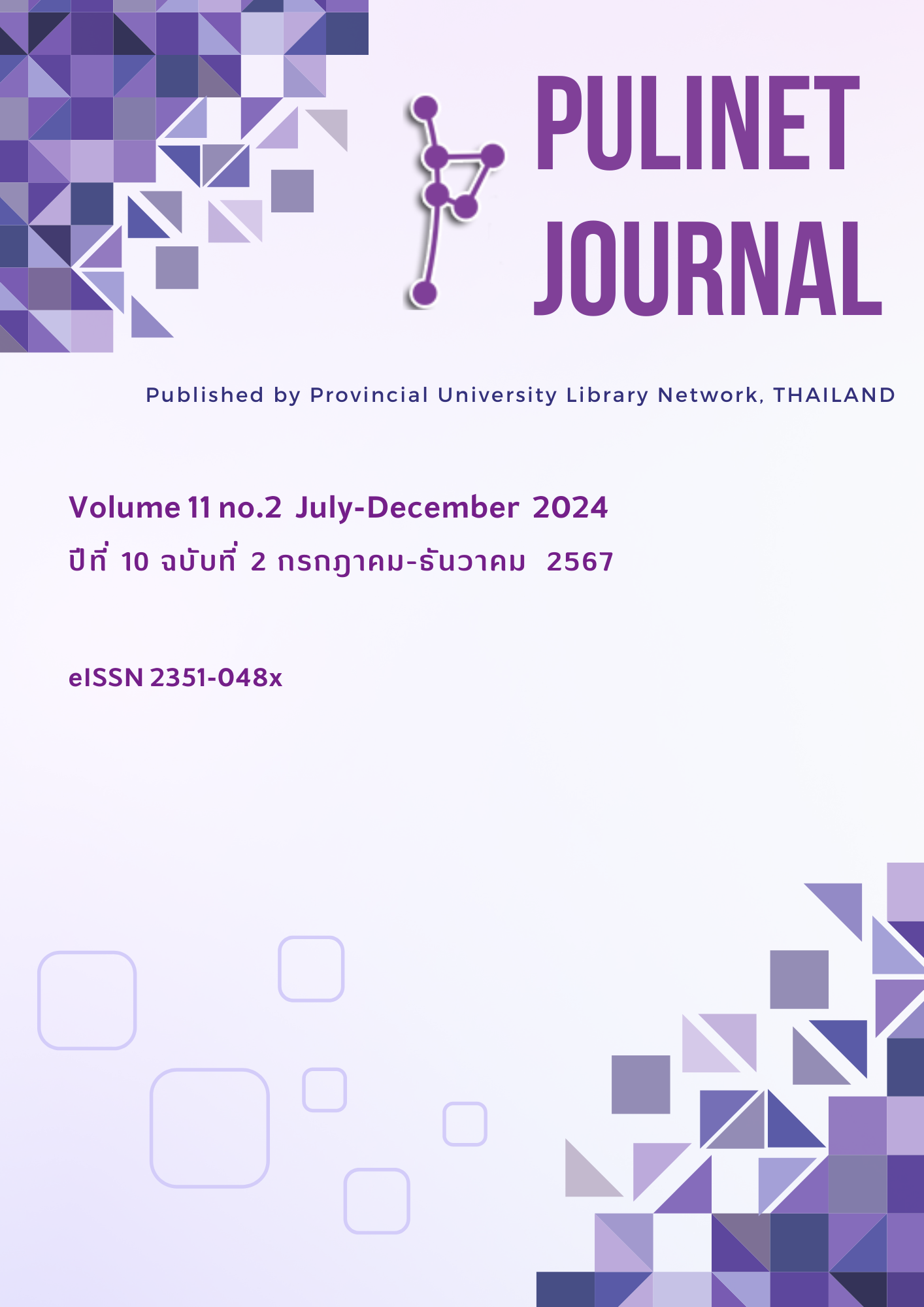กระบวนการพัฒนาสมรรถนะดิจิทัลให้แก่บุคลากรสำนักหอสมุด มหาวิทยาลัยขอนแก่น
Main Article Content
บทคัดย่อ
สำนักหอสมุดเห็นความสำคัญในการส่งเสริมสมรรถนะดิจิทัลของบุคลากรเพื่อสนับสนุนมหาวิทยาลัยขอนแก่นเป็นมหาวิทยาลัยดิจิทัล วัตถุประสงค์เพื่อ (1) พัฒนากระบวนการส่งเสริมสมรรถนะดิจิทัลให้กับบุคลากรสำนักหอสมุด (2) เพื่อให้ได้แนวทางดำเนินงานในการพัฒนาสมรรถนะดิจิทัลของบุคลากร โดยศึกษารูปแบบการทำงานของคณะกรรมการพัฒนาบุคลากรระหว่างปี 2564-2566 วิธีดำเนินการ (1) ศึกษารูปแบบการทำงานในปีงบประมาณ 2564-2566 (2) สรุปผลการดำเนินงานการส่งเสริมสมรรถนะดิจิทัลของคณะกรรมการพัฒนาบุคลากร (3) กำหนดกระบวนการดำเนินงานที่เป็นแนวปฏิบัติที่ดีของคณะกรรมการพัฒนาบุคลากรในการส่งเสริมสมรรถนะดิจิทัลสำหรับบุคลากรต่อไป ผลการดำเนินการที่ได้ (1) ได้กระบวนการพัฒนาสมรรถนะดิจิทัล 8 ขั้นตอน, และบุคลากรสามารถสอบผ่านเกณฑ์ทักษะด้านดิจิทัลที่กำหนด และสูงกว่าค่าเป้าหมาย (ร้อยละ 40) ที่ตั้งไว้, จัดหลักสูตรภายในที่จำเป็นต่อการปฏิบัติงานจำนวน 22 หลักสูตร (2) แนวทางในดำเนินงานควรส่งเสริมการพัฒนาตนเองด้านดิจิทัลที่ใช้งบประมาณจัดสรรส่วนบุคคลให้มากขึ้น ซึ่งพบว่าบุคลากรจำนวนน้อยที่ใช้งบประมาณในการพัฒนาด้านนี้ สิ่งที่ต้องคำนึงของการดำเนินงาน คือ ภาวะฉุกเฉิน เช่น การปรับเปลี่ยนเกณฑ์การทดสอบ เพื่อนำมาออกแบบและกำหนดแผนงานในปีงบประมาณถัดไป
Downloads
Article Details

อนุญาตภายใต้เงื่อนไข Creative Commons Attribution-NonCommercial-NoDerivatives 4.0 International License.
เอกสารอ้างอิง
คัชพล จั่นเพชร และ วิโรจน์ เจษฎาลักษณ์. (2559). อิทธิพลของการรับรู้ภาวะผู้นำแบบเปลี่ยนสภาพที่ส่งผลต่อการปฏิบัติงานเชิงสร้างสรรค์ผ่านความไว้วางใจบนพื้นฐานอารมณ์ความรู้สึก และความรู้ความเข้าใจ. วารสารวิจัยราชภัฏพระนคร สาขามนุษยศาสตร์และสังคมศาสตร์ มหาวิทยาลัยราชภัฏพระนคร, 11(1), 125-135.
นฤมล จิตรเอื้อ, เฉลิมชัย กิตติศักดิ์นาวิน, และ นลินณัฐ ดีสวัสดิ์. (2560). บทบาทภาวะผู้นำในการพัฒนาองค์การสู่องค์การแห่งการเรียนรู้. Veridian E-Journal, Silpakorn University ฉบับภาษาไทย สาขามนุษยศาสตร์ สังคมศาสตร์ และศิลปะ, 10(2), 1738-1754.
นารถ จันทวงศ์. (2564). กระบวนการและเทคนิคในการพัฒนาคุณภาพการบริหารจัดการภาครัฐระดับพื้นฐานหมวด 6 การจัดการกระบวนการ. https://www.opdc.go.th/file/reader/OHF8fDU3Njh8f GZpbGVfdXBsb2Fk
มหาวิทยาลัยขอนแก่น. (2563). แผนยุทธศาสตร์การบริหาร มหาวิทยาลัยขอนแก่น พ.ศ. 2563 – 2566. กองยุทธศาสตร์ มหาวิทยาลัยขอนแก่น.
มารุต พัฒผล. (2558). เอกสารประกอบการเรียนรู้รายวิชา การโค้ชเพื่อการรู้คิด Module 14 การให้ข้อมูลย้อนกลับอย่างสร้างสรรค์. บัณฑิตวิทยาลัย มหาวิทยาลัยศรีนครินทรวิโรฒ.
ศูนย์นวัตกรรมการเรียนการสอน มหาวิทยาลัยขอนแก่น. (2566ก). การทดสอบสมรรถนะความฉลาดทางดิจิทัล สำหรับบุคลากร (KKU DQ). https://dcert.kku.ac.th/
ศูนย์นวัตกรรมการเรียนการสอน มหาวิทยาลัยขอนแก่น. (2566ข). สมัครเข้าทดสอบสมรรถนะความฉลาดทางดิจิทัล สำหรับบุคลากร (KKU DQ) ประจำปี 2566. https://dcert.kku.ac.th/my/courses.php
สำนักงานปลัดกระทรวงดิจิทัลเพื่อเศรษฐกิจและสังคมแห่งชาติ. (2561). ยุทธศาสตร์ชาติ 20 ปี พ.ศ. 2561-2580. https://kku.world/ponbe.
สำนักหอสมุด มหาวิทยาลัยขอนแก่น. (2564ก). แผนปฏิบัติการและการถ่ายทอด OKR/KRL ประจำปี 2564. สำนักหอสมุด.
สำนักหอสมุด มหาวิทยาลัยขอนแก่น. (2564ข). รายงานประจำปี 2564. สำนักหอสมุด.
สำนักหอสมุด มหาวิทยาลัยขอนแก่น. (2565ก). แผนปฏิบัติการและการถ่ายทอด OKR/KRL ประจำปี 2565. สำนักหอสมุด.
สำนักหอสมุด มหาวิทยาลัยขอนแก่น. (2565ข). รายงานประจำปี 2565. สำนักหอสมุด.
สำนักงานคณะกรรมการข้าราชการครูและบุคลากรทางการศึกษา. (2563). กรอบแนวทางการพัฒนาสมรรถนะดิจิทัลสำหรับข้าราชการครูและบุคลากรทางการศึกษา. https://utdone.net/llkan303.html
สิริพร ทิวะสิงห์, คมศรี คมน์ทิพยรัตน์, และ มุกดา ดวงพิมพ์. (2566). 5 กลยุทธ์ในการส่งเสริมสมรรถนะด้านดิจิทัลเพื่อเพิ่มทักษะในอนาคตของบุคลากรสำนักหอสมุด มหาวิทยาลัยขอนแก่น. PULINET Journal, 10(1), 12-27.
หริรักษ์ แก้วกับทอง. (2560). เอกสารประกอบการบรรยาย บทบาทอาจารย์ที่ปรึกษากับเด็กไทยยุคดิจิทัล. มหาวิทยาลัยราชภัฎสุราษฎร์ธานี.
อัญชลี เหลืองศรีชัย. (2564). การเป็นองค์กรแห่งการเรียนรู้ในยุคดิจิทัลตามความคิดเห็นของบุคลากรในสังกัดอาชีวศึกษาจังหวัดปทุมธานี. วารสารมนุษยศาสตร์และสังคมศาสตร์ มหาวิทยาลัยราชพฤกษ์, 2, 170-186.
อัญสุชา บุญขันตินาถ. (2561). การพัฒนาทักษะด้านดิจิทัล สำหรับข้าราชการครูและบุคลากรทางการศึกษา. วารสารข้าราชการครูและบุคลากรทางการศึกษา, 39(1), 5-8.
Banihashemi, S., & Rastegari, H. (2019). The role of digital transformation in achieving sustainable competitive advantage. International Journal of Electronic Commerce Studies, 10(1), 44-59.
Baro, E.E., Obaro, O.G., & Aduba, E.D. (2019). An assessment of digital literacy skills and knowledge-based competencies among librarians working in university libraries in Africa. Digital Library Perspectives, 35(3/4), 172-192.
Dalkir, K. (2013). The knowledge management toolkit: Orchestrating IT, strategy, and knowledge platforms. (2nd ed.). Pearson.
Emiri, O. T. (2017). Digital literacy skills among librarians in university libraries in the 21st Century in Edo and Delta States, Nigeria. International Journal of Library and Information Services (IJLIS), 6(1), 37-52.
Hamad, F., Al-Fadel, M., & Fakhouri, H. (2021). The effect of librarians’ digital skills on technology acceptance in academic libraries in Jordan. Journal of Librarianship and Information Science, 53(1), 1-12.
Gordon, T. (1975). P.E.T. parent effectiveness training: The tested new way to raise responsible children. New American Library.
Lambie, J. (2018). Should you hide negative emotions from children?. https://theconversation.com/should-you-hide-negativeemotions-from-children-104710
Thite, M. (2022). Digital human resource development: where are we? Where should we go and how do we go there? Human Resource Development International, 25, 187-103.
Wiig, K.M. (1997). Knowledge management foundations: Thinking about thinking: How people and organizations create, represent, and use knowledge. Schema Press.


